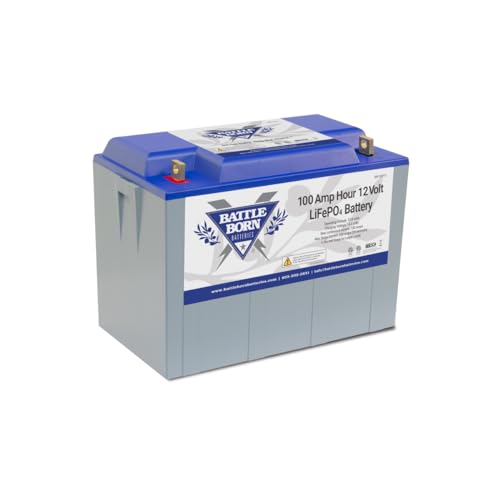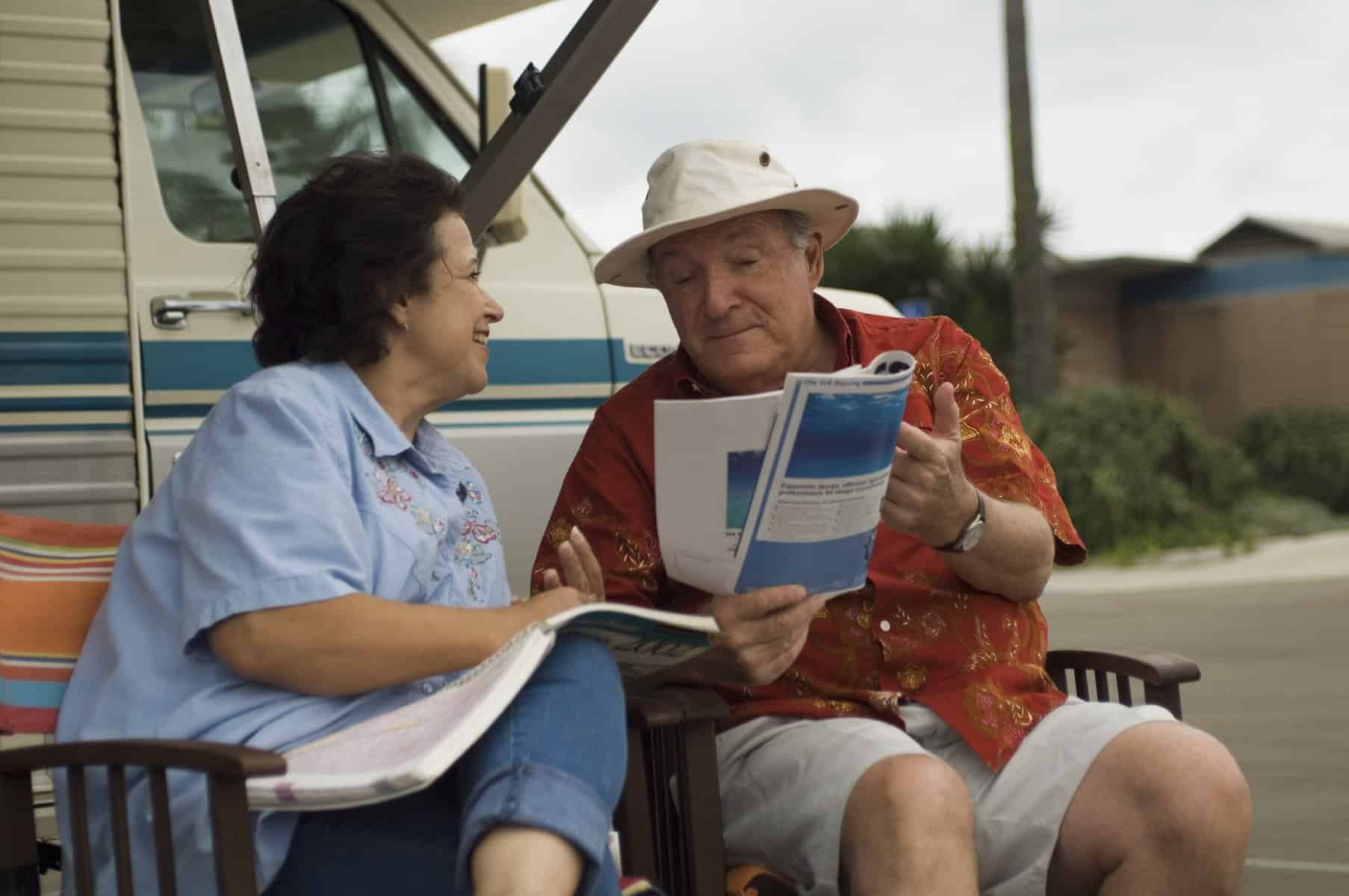Many RV battery types and brands are currently sold, so choosing the best RV battery for your needs can be a bit daunting. Even if you don’t dry camp frequently, you’ll still want reliable house batteries to power your RV.
In this buying guide, I will review one of the highest-rated RV batteries, the one I recommend the most, and four other batteries worth considering.
The Best Overall RV Battery – Battle Born LiFePO4 Deep Cycle
- Up to a Decade of Use - Enjoy superb return on your investment with this heavy duty 100Ah 12V LiFePO4 battery! This 100Ah 12V lithium battery lasts 3,000 - 5,000 deep discharge cycles,...
- Built for Rugged Adventures - Our fast-charging LiFePO4 100Ah 12V batteries are the perfect camper, van, boat, trolling motor, and lithium RV battery. Battle Born Batteries are also...
Last update on 2024-04-19 / Paid Affiliate Link / Images from Amazon Product Advertising API
Specifications:
- Voltage: 12 Volts
- Battery Cell: Lithium-Ion
- Capacity: 100 Ah
- Weight: 31 lbs
- Warranty: 10 Years
Why Do I Recommend the Battle Born As The Best RV Battery?
I chose Battle Born as my top pick for the best RV battery for several reasons. As a house battery, it offers top performance and dependability. The lithium-ion battery cells provide up to 3000-5000 deep cycles.
They are made in the USA using safe, non-toxic, renewable materials. Due to the lightweight, just 21 lbs, and the closed cells offer unlimited mounting capabilities.
- Battery Management System – The built-in Battery Management System is designed to protect your battery from some of the most common failures, such as ground faults and extreme temperature volatility.
- Long Battery LifeSpan– Battle Born batteries last 10X longer than lead-acid batteries.
- Deep Cycles – With 3,000 to 5,000 deep cycles of deep cycles, you can recharge them many times over.
- Safer Than Lead-Acid – Lithium batteries are safer than lead-acid, and you can mount them in just about any position.
- 10-Year Warranty – Yes, you read it right. Battle Born batteries have one of the longest warranties in the industry.
- Lightweight and Maintenance Free – Weighs just 1/5 the weight of lead-acid batteries. It’s also practically maintenance-free.
The Battle Born Lithium-Ion battery is one of the best RV batteries you can buy. It gets very positive reviews online. Yes, it’s expensive; however, it has a very long lifespan, making it a very good investment in the long run.
Best RV Battery for Boondocking – Ampere Time LeFePO4 Deep Cycle
- 【Automotive Grade LiFePO4 Battery】LiTime 12V100Ah LiFePO4 battery have exceptional quality since they are manufactured by Automotive Grade LiFePO4 Cells with higher energy density,...
- 【10 Years Lifetime】LiTime LiFePO4 battery provides 4000~15000 cycles (10 times longer) 4000 Time Cycles at 100% DOD, 6000 Time Cycles at 80% DOD, 15000 Time Cycles at 60% DOD & a...
Last update on 2024-04-19 / Paid Affiliate Link / Images from Amazon Product Advertising API
This Ampere Time battery has a lot going for it, making it an excellent RV battery. First, it’s a LiFe PO 4 battery which you can learn about here.
Let’s go over the specification of this battery then I’ll discuss the performance. The Ampere Time battery is a maintenance-free Lithium-Iron Phosphate battery. It’s a very lightweight battery coming in at just over 24 lbs. Compared to lead-acid batteries with the same capacity, you’ll find that the Ampere Time battery weighs 1/3.
According to the manufacturer, it has a 10-year service life, which I have not tested. The battery is rated IP65 Level Water Proof; you can learn about the different water-proof ratings here.
The battery is also vibration resistant and can hold its voltage at approximately 12.8V to 13.8V.
Another excellent feature of the Ampere Time 100Ah battery is the built-in Battery Management System or BMS. The BMS monitors and protects against overcharge, over-discharge, over-current, and short circuits.
Hardly any product is without its detractors, and this battery is no different. Based on my research of online reviews, several buyers have reported the battery goes bad after a few months, and it doesn’t hold its charge as it should.
Those reports have been a small percentage compared to those who have found the battery quite acceptable and a great value for the price. Customer service seems very good, as evidenced by the manufacturer’s easy return policy.
Best Budget-Friendly – Windy Nation 100Ah AGM RV Battery
- WindyNation 100 amp-hour, 12 Volt heavy duty deep cycle AGM sealed lead acid batteries with heavy duty plates are designed for deep, repetitive discharges.
- Ideal for all types of off-grid power: Solar Systems, RV's, UPS, Off shore Marine power, Telecommunications, Portable tools, etc.
Last update on 2024-04-19 / Paid Affiliate Link / Images from Amazon Product Advertising API
WindyNation deep cycle batteries are specially designed to offer off-grid power. They are the perfect choice for RVs since you will spend most of your time in remote areas where a dependable energy source comes in handy.
The sealed and maintenance-free design is suitable for recreation purposes such as RVing.
It does have one major drawback, and that is its weight. The battery weighs 68 lbs which is a lot of weight. Almost 3X the weight of a comparable Lithium-Ion battery.
The battery also has a non-spillable design that allows it to be used in areas requiring such batteries. If you choose this battery, you will always be on the safe side, no matter the location of your adventure.
Despite the number of times the battery gets discharged and recharged, it can endure for a long time, making it the best RV battery for those on a budget or who prefer not to buy a lithium RV battery.
The WindyNation Deep Cycle AGM battery is an all-around good battery with good performance at a reasonable price.
Best AGM RV Battery – Renogy Deep Cycle AGM Battery
- Renogy AGM Batteries: Trusted Worldwide, Exceptional Safety, Extreme Performance! Support series (No limitation), parallel (Up to 4P) connections.
- 【Leading AGM Batteries】Renogy Deep Cycle AGM batteries have earned widespread trust with over 230,000 units sold worldwide in the past six years.
Last update on 2024-04-19 / Paid Affiliate Link / Images from Amazon Product Advertising API
The Renogy Deep Cycle AGM battery was designed with an off-grid application. It has a low self-discharge rate of approximately 3% per month at 77 degrees F.
This battery is leak-proof and spill-proof; however, it is recommended you install it upright. Only install it on its side if necessary. Installing it upside down is NOT recommended.
The improved electrolyte formula ensures stable capacity and excellent discharge performance even at temperatures below 32 degrees F.
The Renogy deep cycle battery is made with Pb-ca alloy, which has the strength to withstand corrosion. Your battery will, therefore, last longer than other cells on the market.
If you have had a battery before, you agree that most of them are destroyed by high current discharging. For Renogy, it is optimized to overcome this challenge and give you long-lasting service.
- Always charge the battery with the recommended voltage and ensure it is fully charged.
- Refrain from over-discharging batteries.
- The recharge capacity should be 1.1 – 1.5 of the discharge capacity.
Paired with a Renogy Solar panel kit, this battery will keep your electronics running smoothly.
Want to learn more about solar panels? Check this article I wrote; Solar Panel Pros and Cons
Overall the Renogy Deep Cycle AGM battery is one you should consider, especially if you are going to use it off-grid. Remember, there have been some quality issues lately, and verified buyers have reported poor customer support.
Renogy makes a very good battery, so I hope these issues can be addressed and corrected.
Best Lithium RV Battery – Redodo LiFePO4 Deep Cycle Battery
- 【Long Life & Deep Cycle】Redodo 12V 100AH LiFePO4 battery uses Automotive Grade LiFePO4 Cells, which gets low self discharge rate at only 3% and provides 4000~15000 cycles and...
- 【60% Lighter & 5% Smaller】Redodo 12V lithium battery 100AH measures L13*W6.77*H8.43 inches and only 22.04 lbs, which suits BCI Group 31 battery box perfectly. While the 12V100AH...
Last update on 2024-04-19 / Paid Affiliate Link / Images from Amazon Product Advertising API
The Redodo Lithium battery is designed for a minimum of 4000 recharging cycles. It can provide up to 10 years of reliable service and performance.
Since it uses prismatic LiFePO4 cells, it provides better stability, lighter weight (25.35 lbs), and higher energy density. This allows the batteries to be operated at high temperatures while still outputting high power and minimizing the self-discharge rate.
The five-year warranty is half as little as most competing lithium battery brands, so that is something to consider. The Redodo is an environmentally safe battery with no heavy or rare Earth metals.
Great batter overall, especially the reasonable price, but the warranty could be better.
Types of Batteries You’ll Find in An RV
There are two types of batteries that you will find in your RV. What you find will depend on whether or not yo you have a travel trailer or a driveable RV like a Class A RV Motorhome, Class B Camper Van, or Class C RV.
![RV-Battery-Construction-Type What Are RV Batteries Used For? [rvliving.com]](https://rvliving.com/wp-content/uploads/2022/07/RV-Battery-Construction-Type.png)
The types of RV batteries are as follows:
Chassis Battery
The chassis RV battery is also known as the starter battery. This is the battery that is used to start your driveable RV. It functions the same as your car battery. It is there to create a large current burst over a short period to get the components of your RV going and the starter turning so your engine can start.
These are the characteristics of a chassis battery:
- The internal battery plates are thin maximizing exposure to the electrolyte.
- Cold Cranking Amps or CCA is the way these batteries are rated. This allows you to compare performance to meet your needs.
- It is not a deep-cycle battery, a characteristic of an RV house battery discussed next.
House Battery 12-Volt or 6-Volts
The RV battery that supplies 12 volts to run your RV lights, microwave, TV, etc., is called the house battery. Often you will have more than one. When you hear the term “deep cycle RV batteries,” this is the battery they are referring to.
These are the characteristic of an RV house battery:
- It is a deep cycle battery with think plates that allow the battery to be charged and recharged many, many times (cycles)
- Amp Hours (Ah) is how these batteries are rated and can be compared so you can make the right buying decision. CCA is not used to rate house batteries.
- Designed to provide a steady current over long periods, such as boondocking.
Deep Cycle RV Battery Construction Types
Among all battery brands, there are essentially three types of deep-cycle batteries. Let’s review each construction type and the pros and cons of each one.
Conventional Flooded Electrolyte
This is your typical battery type and will be the most familiar. This is also the type that is most often shipped with an RV.
You’ll need to check water levels and add distilled water when needed; corrosion often accumulates around the terminal post, so that will need to be cleaned; they offer fairly good capacity at a reasonable cost.
Gel Batteries
Gel batteries use a battery acid in the form of a gel. Because of this, they are leak-proof. Gel batteries are excellent for marine use but not so much for RV use.
They must be charged at a slower rate and with lower voltage. Overcharging may cause permanent damage.
AGM (Absorbed Glass Mat)
Absorbed Glass Mat, or what is often referred to as AGM batteries, use a fiber-type mat between the plates. The mat is 90% soaked in electrolytes.
AGM batteries are more expensive than standard batteries but have some advantages.
AGM batteries are charged the same as standard lead-free batteries; there is no water loss, they won’t leak, and they are almost maintenance-free, and it’s highly unlikely they will freeze.
Lithium Ion
Lithium batteries have many advantages over AGM and lead-acid batteries. They are constructed using an anode and cathode with a separator between the two electrodes and an electrolyte filling the remaining space.
This allows the anode and cathode to store lithium ions, and energy is released as the ions traverse back and forth between the two electrodes.
Lithium Ion batteries have many benefits over AGM or lead-acid batteries, including lighter weight, better temperature stability, better power efficiency, and the ability to be recharged hundreds of times.
Check out the infographics below for a summary of the pros and cons of the different types of RV batteries.
Final Thoughts
Choosing the best RV battery for your camper or motorcoach will depend on several factors. The three most important are how you will be using the RV batteries, your budget, and how much space you have in your RV for batteries.
Once you have taken all of that into account, narrowing down your selection should be easy.
Best RV Battery FAQ
What Size Battery For Travel Trailer?
The higher the Amps Hours (Ah), the longer you can use the power, depending on how many amps your camper pulls.
The other rating you want to consider is the Reserve Capacity (RC). This rating tells you how many minutes the battery can deliver 25 amps of current before falling below the threshold of 10.5 volts.
The higher both of these ratings, the better your option.
Are Lithium Iron or Lithium Ion Batteries The Best Power Source For An RV If I Plan To Boondock Off The Grid A Lot?
The Renogy Lithium-Iron battery above is well over $1,000. Sure, you may be one of those that need the amount of power a lithium battery provides for extended periods.
I would invest in some nice solar panels like these solar panels on Amazon and use AGM deep cycle batteries.
How Long Should RV Batteries Last?
Good batteries, on average last 5-7 years, Lithium batteries can last much longer.
Not letting your battery lose more than 50% of its charge before recharging extends the battery’s life and properly maintains them as outlined above.
Can I use a Car battery in my RV?
Suppose you need house batteries for your RV, then you cannot use a car battery. You need a deep cycle RV battery like the best RV batteries we noted in this post.








